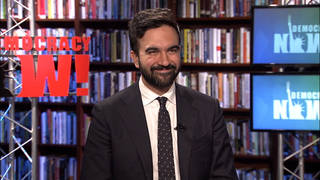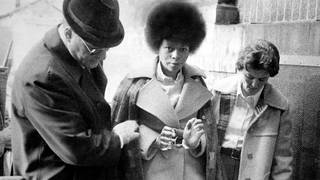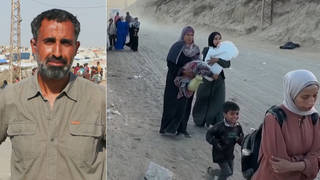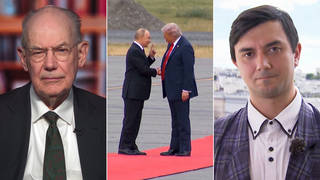
Guests
- Timothy Snyderauthor, professor of history at Yale University and fellow at the Institute for Human Sciences in Vienna.
We speak to Yale University historian Timothy Snyder about his latest article for The New Yorker, “The War in Ukraine Is a Colonial War.” Snyder writes about the colonial history that laid the foundations for the Russian war in Ukraine, such as Russia’s imperial vision and how leaders including Hitler and Stalin have aimed to conquer Ukrainian soil on different premises. “The whole history of colonialism … involves denying that another people is real. It involves denying that another state is real,” says Snyder. “That is, of course, the premise of Russia’s invasion of Ukraine.”
Transcript
AMY GOODMAN: This is Democracy Now!, democracynow.org, The War and Peace Report. I’m Amy Goodman, with Nermeen Shaikh, as we continue our discussion about Ukraine by examining the historical context of the Russian invasion with an historian who says Putin’s war is a colonial one. Timothy Snyder is a professor of history at Yale University, a permanent fellow at the Institute for Human Sciences in Vienna. He’s the author of several books — Bloodlands: Europe Between Hitler and Stalin. A new revised version has just been published with a new afterword. He’s also author of The Road to Unfreedom: Russia, Europe, America, as well as the best-selling On Tyranny: Twenty Lessons from the Twentieth Century. An expanded version, audio version, of On Tyranny is just out, updated with 20 new lessons from Russia’s war with Ukraine. In his recent article for The New Yorker, which is headlined “The War in Ukraine Is a Colonial War,” Timothy Snyder talks about just what that means.
Professor Snyder, welcome back to Democracy Now! What exactly do you mean?
TIMOTHY SNYDER: Well, I have in mind that the whole history of colonialism, which is very familiar to us from European or, for that matter, American cases, involves denying that another people is real, involves denying that another state is real. And that is, of course, the premise of Russia’s invasion of Ukraine. Mr. Putin has made very clear, actually for the past 10 years or so, that he doesn’t believe that Ukrainians are a people and he doesn’t believe that the Ukrainian state is actually a real state. Those are the classic arguments that Europeans made for 500 years when they colonized other people. So the premises are colonial.
And the practices are also colonial. This war is being carried out in such a way not only to win territory, but to try to decapitate Ukrainian society, to try to separate families one from another, to try to subordinate the territories that have been conquered to a larger Russian empire. So, that’s what I had in mind.
NERMEEN SHAIKH: And, Tim, could you talk about the historical antecedents for Russia, Russia’s colonial history in what they called the “near abroad”?
TIMOTHY SNYDER: Mm-hmm. I mean, there’s a — if I could, there’s a longer history of Ukraine being a target of colonialism even than there is a history of the Russian Empire. The first colonization of Ukraine was actually from the side of Poland in the 17th century. Russian colonization of Ukraine begins in the 17th and 18th centuries, and it becomes pronounced as a form of empire in the 19th century, when we begin to have this idea, this kind of ethnic imperial idea, that Ukraine is not a separate place, Ukrainian language doesn’t really exist, Ukrainian culture doesn’t exist, and if it does seem to exist, it should be banished. So, the Russian Empire was obviously conceived of as an empire, but then, as we move into the 20th century, as I’m sure you’ll be interested to talk about, too, there are neoimperial ideas about Ukraine, as well, from both the Soviet side and from the Nazi German side.
NERMEEN SHAIKH: And, Tim, if what you say is accurate, that Russia’s aims in Ukraine are in fact colonial, then what kind of resolution would be possible in this war?
TIMOTHY SNYDER: I think that’s a very important question, because, look, colonialism is all about recognition of a subject, right? I mean, Frantz Fanon writes about this. Other important imperialist — scholars of imperialism write about this. Russia does not recognize Ukraine as a subject. It doesn’t recognize Ukrainians as existing. And therefore, from the Ukrainian point of view, quite understandably and quite correctly, this is an existential situation. When you’re faced with a war of destruction, then, naturally, you’re in an existential situation, which means, from the Ukrainian point of view, the only way towards peace is victory, which I think is actually correct.
The only way for Russia to understand that this ideology hasn’t worked is for it not to work in practice — that is to say, for the Russians to be forced to acknowledge that Ukraine actually exists. And if that’s our measure, we can actually see a certain amount of progress. Late last year, Russians were refusing — I should say, the Kremlin, the Russian leadership, was refusing entirely to acknowledge that Ukraine existed. It insisted on talking to the Americans. It described the Ukrainian state as vassals. It described Volodymyr Zelensky as some kind of illegitimate, you know, Jewish clan leader. Whereas now, even if reluctantly, the notion that Russia will have to negotiate with Ukraine at some point is now becoming normal. So I’m afraid that the only way to resist a colonial war, if you’re on the side of the people who are being colonized, is to win that war.
AMY GOODMAN: I want to go back for a second, Professor Snyder, to World War II, to what you talked about, both the Soviet Union and Nazi Germany occupying Ukraine, what this meant for the Ukrainians and the sides that Ukrainians took in this, especially in the German-occupied side in western Ukraine, places like Lviv and Rivne and other places.
TIMOTHY SNYDER: Mm-hmm. So, I mean, Ukraine is fascinating, because it brings together the big themes of world history. In the 20th century, the major theme of world history, at least in my view, is colonization and decolonization. And in that major theme, we have certain attempts at neo-empire — that is, European powers trying to establish empire on new premises. If you look at the history of the 20th century in Europe from the Ukrainian point of view, that’s what you tend to see.
So, the Soviet Union is a project of repeating the stages of capitalism at an accelerated pace. And one of those stages, from a Leninist point of view, is imperialism. And Stalin was quite clear that he was going to treat the territory of the Soviet Union, particularly its periphery, as a kind of colonial territory to be exploited. And within that framework, it’s pretty easy to understand why it is that Ukraine, with its fertile black earth, was the center of exploitation in the Soviet Union during the first Five-Year Plan, leading to a famine in which millions of Ukrainians died.
Hitler, looking at that famine, looking at Stalin’s attempt to control Ukrainian food resources, thought that this was a very good idea indeed, because Hitler’s view of Ukraine was also that the black earth could be a basis for the creation of a new kind of empire, a different kind of empire, a racial empire. But so, Hitler’s main war aim in invading the Soviet Union was to control Ukraine and its black earth. That’s what he meant by Lebensraum. So, Nazi colonialism in 1941 then attempts to displace the Soviet project of collectivizing Ukrainian agriculture. But from the Ukrainian point of view, what’s essential about all this is that Ukraine is in the middle, right? Ukraine is in the middle of these two overwhelming forces.
In terms of the sides that Ukrainians took in the Second World War, the vast majority of Ukrainians who fought in the Second World War, as Tim mentioned in the previous segment, were fighting in the Red Army. Far more Ukrainians died fighting Germans than Americans did. For that matter, more Ukrainians died fighting Germans than Americans and British and French combined. And the civilian casualties in Ukraine under German occupation were horrific, greater actually not just in relative but in absolute terms than in the occupation of Soviet Russia.
I’m sure what you had in mind with the question, though, was the issue of Ukrainian nationalism, which is one of the main things I’ve studied in my career. Ukrainian nationalism is a minor terrorist underground activity in interwar Poland. Ukrainian nationalists, the Organization of Ukrainian Nationalists, have their day after 1939, which is when the Soviet Union and Nazi Germany unite, according to the terms of the Molotov-Ribbentrop Pact, to destroy Poland. With the destruction of Poland, Ukrainian nationalists come out of prison, and they see that they have an opportunity, because they want to support a power which can destroy both Poland and the Soviet Union. So they side politically with Germany. Some of them collaborate with Germany in its attempt to overthrow the Soviet Union. When that fails, in about 1943, they switch sides. They go underground again and try to fight against the Soviet Union on their own. Along the way, they ethnically cleanse quite a large number of Poles. They’re defeated by the Soviet Union. They’re crushed in a bloody counterinsurgency. Their families are deported to the Gulag. Ukrainians will be overrepresented in the Gulag for the rest of the Soviet Union. And that version of Ukrainian nationalism will be utterly defeated.
Today the far right in Ukraine polls at between 0.5% and 2.5%, which means that it’s far less than in Russia, obviously, where the far right is in power, or in countries like Germany or the United States, for that matter.
NERMEEN SHAIKH: And, Tim, I’d like to go back to what you were saying about what would constitute a victory in this — what you call a colonial war, which is, namely, the defeat of the colonizing power. But what about some kind of compromise solution, which is what some observers have been suggesting is the most likely outcome — namely, a division within Ukraine?
TIMOTHY SNYDER: Well, I guess we have to be very careful ourselves about not falling into colonial language when we talk about Ukraine. When I talk about Ukraine as having a colonial history, that’s meant as a kind of self-awareness check for all of us. So, we do have a certain tendency — actually, a very strong tendency — in the West, in the United States, on the left often, to look at all of Europe by way of the imperial center, which is Moscow. This war is a chance for us to rethink our concepts and the way that we look at places. So, if we think of Ukraine as a colonial — as a site of colonial war, the first thing we have to do is to listen to what the Ukrainians themselves say, right? The same kind of historical check that we would carry out in American history if we’re trying to check the biases of white Americans, for example, we have to carry out with imperial history generally. So, we have to think, “OK, what do the Ukrainians say about this?” And we have to remember that Ukraine is a sovereign state.
So, when there is a peace agreement, as I hope there will be as soon as possible, that peace agreement will be negotiated between Ukraine and Russia, between those two sovereign states. Should the Ukrainians choose to make some kind of arrangement involving their own sovereign territory, that is their business, right? That is their business.
I will point out, though, that — and if we look at this in the general sweep of colonial warfare, if we think of comparative examples from, say, the Dutch or the French or the Spanish, generally what happens is that the colonial power has to realize that it’s been exhausted, before you get to that kind of a deal. I wish that weren’t true, but that’s what the sweep of colonial and anti-colonial history seems to tell us, that only when the French feel that they’re exhausted — right? — in Algeria or in Southeast Asia, only when the Dutch realize they’re exhausted in Indonesia and so on, does it come home that some kind of a deal has to be made.
In other words, I’m not so concerned about the Ukrainians making a deal. They’ve been talking all along about their willingness to make a deal. What I’m more concerned about is when it reaches — when it becomes a matter of understanding in Moscow that a deal has to be made. And as I said before, I’m afraid, whatever that deal is — and we’re not the ones who get to say what that deal is, but whatever that deal is, it, I’m afraid, only will come when Ukraine wins, because that’s the only thing which can lead to that kind of rethinking on the part of the imperial power.
NERMEEN SHAIKH: And, Tim, I suppose one of the massive differences between the French colonization of Algeria, or the British in India, or the Dutch in Indonesia, is that, in this case, Ukraine’s anti-colonial war is being substantially supported by the Americans with tens of billions of dollars potentially of additional military aid. What do you think the impact of that will be? And your response to those who say this will just prolong the war and not actually change the terms of it?
TIMOTHY SNYDER: Yeah, that’s a beautiful point that you’re making. I mean, I think when we think about Ukraine and what one ought to do, it then forces us to think back to other even more recent cases, like Syria, what ought we have done in Syria, you know, in a comparable case.
So, in terms of American aid to Ukraine, if the Ukrainians were to capitulate — well, first of all, we can’t stop the Ukrainians from fighting. Even if we didn’t arm them, they would still fight, because they understand that this is an existential war. I mean, whether or not they accept my framework of a colonial war, they see it as a war of existence. So, whether or not we arm them, they’re going to fight. I mean, the notion that we can kind of turn this on and off like a water spigot is, I think — I’m sorry to say it, but I think that’s kind of more American colonialism. Like, we don’t actually have that kind of power.
We can help them try to win. And that is — you know, on this analysis, that’s the best way to try to end this war, because as we have seen in Bucha, in Irpin, in Trostyanets, in Mariupol and everywhere that the Russians have occupied, they really are carrying out a war in which they are executing local civic leaders, executing men of military age, sending men and women — on their own statistics, more than a million people — sorry, predominantly women and children, to Russia, so they will never be Ukrainian again. They are carrying out this war according to principles which the Ukrainians see every day and recognize. Therefore, you know, if it’s a colonial war, even if we could get the Ukrainians to capitulate, which, as I say, they won’t —
AMY GOODMAN: Tim, we have 10 seconds.
TIMOTHY SNYDER: OK. But if they did, all you would see would be the continued colonial genocide of Ukrainians. So, I just can’t see that’s something to be wished for.
AMY GOODMAN: Timothy Snyder, professor of history at Yale University. His books include Bloodlands: Europe Between Hitler and Stalin, and a revised version has just come out, also author of On Tyranny: Twenty Lessons from the Twentieth Century.
A belated Happy Birthday to Denis Moynihan! Democracy Now! has an immediate opening for a news writer/producer. Go to democracynow.org. Apply immediately. I’m Amy Goodman, with Nermeen Shaikh. Stay safe.











Media Options